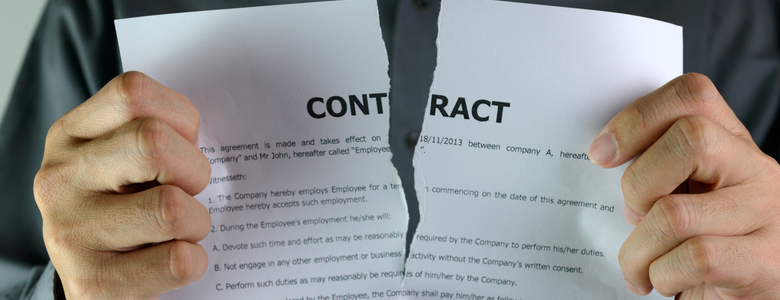
Your Contract Terms Were Violated: What Now?
Contract violations are probably a lot more common than one would expect. In many situations, the breach is due to carelessness or a simple lack of awareness. Most contracts are lengthy documents and contain so much obtuse language that people do not always know or understand the actual terms. And, some people do not even read them, like all those licensing agreements that pop up stating terms of service for using a product. The vast majority of people probably hit agree within seconds of seeing that screen accepting the terms offered, without actually reading what those terms are. Thus, many breaches are not intentional or malicious, but rather inadvertent lapses. Of course, there are plenty of instances in which business contracts are breached on purpose, often for strategic reasons.
If a company detects that one of its contracting partners is on the brink of making this sort of decision, it should obviously reach out to try to negotiate an arrangement to avoid it. Unfortunately, there are times when a company may not be able to save a collapsing contract. So, regardless of when or why a contract is breached, a company must ensure that it acts swiftly to mitigate the impact. Here are some steps to take, although they are not necessarily listed in chronological order, as it may be best to exercise some of these options simultaneously or all of them at once:
Attempt to Resolve Amicably
This may seem like common sense, but so many companies are quick to run straight to the courts to sort out matters. Litigation may become inevitable, but filing a lawsuit probably should not be the first course of action. Assuming that attempts were not made prior to the breach or perhaps they started too late, companies should always strive to work with the other party to determine if the situation can be rectified without the costs and hassle of a lawsuit. Of course, caution must be taken to ensure that one party does not end up doing something contrary to the contract or the law, and any attempts at reconciliation must be fair to both sides.
Consult the Contract's Dispute Resolution Clause
If a breach is pending or has occurred, it is always wise to consult the contract, as the dispute resolution clause may provide guidance on how to proceed. In some contracts, these clauses merely require mediation or arbitration prior to the initiation of a lawsuit. However, some contracts may actually spell out in detail what has to happen if certain types of breaches occur. For example, some breaches may trigger a payment clause, allowing for one party to demand the remainder of any outstanding balance. Obviously, different industries, different companies, and different contracts will have their own unique way of doing things, so it is important to review the language of the contract to ensure the appropriate action is taken.
Research Recourse Options
As negotiations and contract review are occurring, someone should be looking into potential avenues of recourse. In some states and for some types of agreements, there may be laws on how certain disputes should be resolved. Leases, for example, are sometimes expected to be handled in a specific manner. In the event that the contract does not adequately address dispute resolution, it is important to know what options may be available. Therefore, it is important to know what the law states and what sort of remedies the affected party may be able to receive.
Contact Counsel
This is listed last only because one would hope that litigation in the court system is the last resort. Of course, that does not actually mean that companies should wait to contact counsel. In most cases, this should probably be the first call that is made, and it should occur the minute that a breach is merely anticipated. Hopefully, companies retain the services of attorneys who are not litigation happy and will first work with opposing counsel to find an agreeable resolution, without having to enter into a drawn out and contentious court battle.
In a perfect world, parties to a contract would perform exactly as the contract stipulates, but this is clearly not a perfect world and something that will surely never happen. Nonetheless, people should always approach a contract dispute with a desire to problem solve and a willingness to compromise to find a mutually beneficial decision as quickly and inexpensively as possible.
With contract lifecycle management software, you can help mitigate contract breaches and their negative aftermath.







